Most women have a dedicated skin care routine for bedtime. However, such diligence is rarely shown for the hair – even though it is an integral part of one’s appearance.
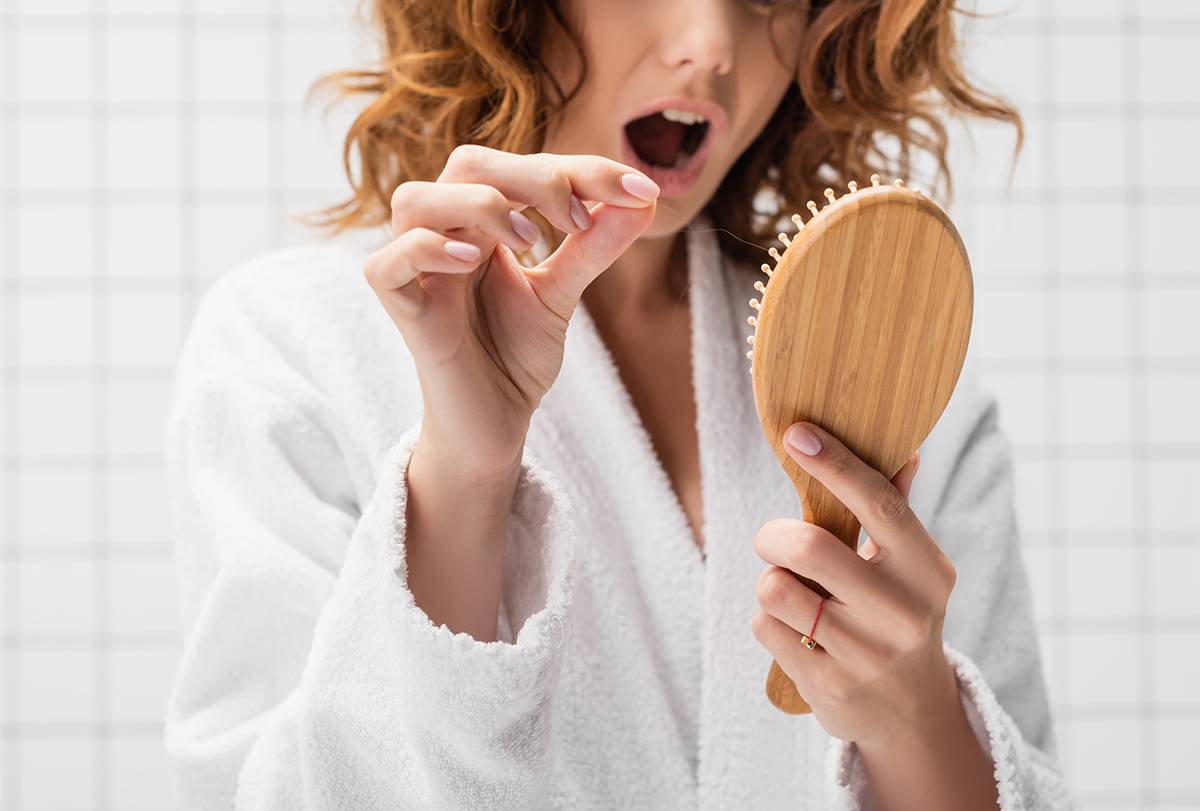
Just like your skin, your hair health is also affected by triggers such as stress, inadequate nutrition, or hormonal imbalances.
According to the American Academy of Dermatology, excessive emotional stress in the past year has led to increased hair loss in minority communities. (1)
Hair shedding can be significantly accelerated by months of stress, which in turn makes one even more distressed, thus triggering a vicious cycle. Having a proper hair care routine may help reduce the levels of hair loss in such cases.
When it comes to hair care, there is no one-size-fits-all regimen. Different people have different hair types that require varied products and levels of care. Nevertheless, there are certain simple rules you can follow to keep your hair strong and healthy. (2)
Here is a list of common hair mistakes many people make at bedtime and steps to avoid them:
1. Sleeping with knotted hair
It is important to brush or comb your hair before going to bed. Your scalp has sebaceous glands underneath it that produce natural oils known as sebum, which is your hair’s natural moisturizer.
Brushing your hair before bed helps distribute this sebum all over them. (2) It also helps get rid of tangles and knots that lead to hair fall.
Make sure to comb your hair using a detangler brush or wide-toothed comb before you head to sleep.
2. Using unwashed pillowcases
Hygiene is necessary for every aspect of your health, and hair is no exception. Your hair rests on your pillows for at least 5–8 hours every day while you sleep. Always use clean, thoroughly washed pillowcases for your pillows, and remember to change them at least once a week. (3)
Dirty pillowcases will end up transferring the dust and germs to your hair, scalp, and even your face while you sleep, resulting in acne or folliculitis. Scalp infections could damage your hair follicles and lead to significant hair loss.
3. Sleeping with untied hair
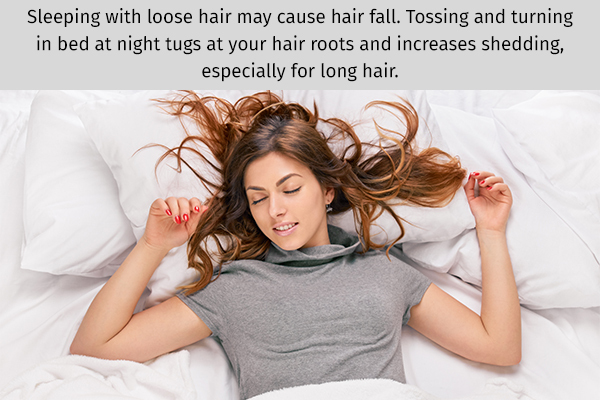
Sleeping with your hair loose may cause hair fall. Tossing and turning in bed at night tugs at your hair roots and increases shedding, especially for long hair.
If your hair is on the longer side, it may be best to braid it loosely before going to sleep. This helps secure your hair and reduce knots or tangles. Braiding your hair can also help lock in moisture naturally and boost hair growth. (4)
Make sure that your braids are loosely tied – to prevent further pressure and tugging on your scalp that may increase hair loss instead of reducing it.
4. Sleeping with hair styling products on
Hair products such as setting sprays or hair color sprays dry your hair out. (5) Dry and damaged hair tends to break easily, leading to hair loss. Also, hair is at its weakest when wet, so it’s best to avoid going to bed soon after washing your hair.
Instead, apply a leave-in conditioner to your hair to counteract the drying effect of hair spray before going to bed.
5. Tying hair up before sleeping
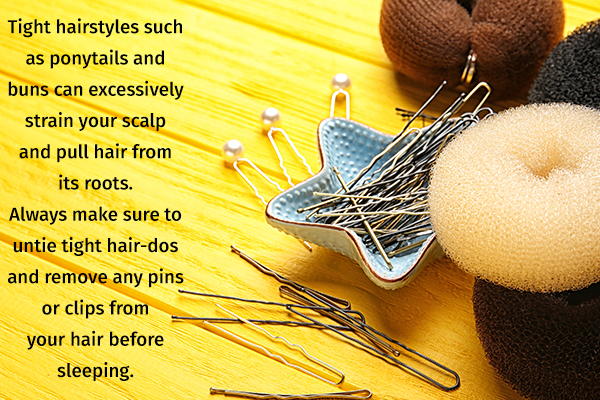
Sleep plays a crucial role in hair growth. Your body secretes a hormone called melatonin while you sleep, which stimulates hair follicles to promote hair growth.
Plus, it is important to keep your hair follicles relaxed during sleep so that melatonin can do its magic. Tight hairstyles such as ponytails and buns can excessively strain your scalp and pull hair from its roots. (3)
Always make sure to untie a tight hairdo and remove any pins or clips from your hair before sleeping.
6. Not using overnight hydrating hair serums
Hair serums boost hair growth and reduce hair damage. (6) There are many types of hair serums available nowadays such as hydrating hair serums, peptide serums for hair growth, and moisture serums for curly hair.
You can buy a silicone-free hair serum for your scalp or use natural hair serums such as diluted aloe vera gel.
Hair serums are best applied before bedtime to allow your scalp to absorb the product overnight, so that you wake up to soft, frizz-free hair.
Massage 2–3 tablespoons of warm coconut oil all over your scalp and hair at least twice a week. Do not use hair serums or dry shampoos on oiled hair.
7. Blow-drying soaking-wet hair
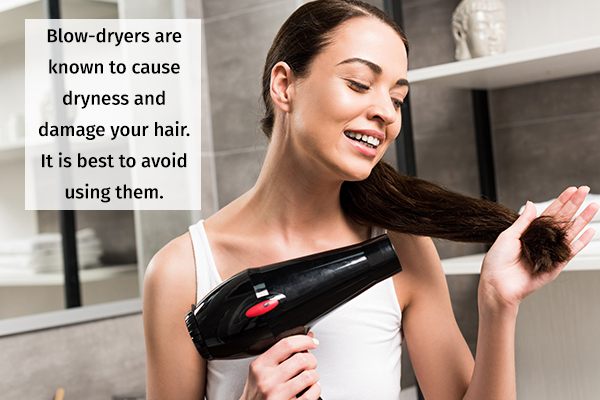
Blow-dryers are known to cause dryness and damage your hair. It is best to avoid using them altogether.
But if you must use a blow-dryer, keep in mind the following:
- Always towel dry your wet hair and let them dry naturally before using dry heat. (7) Cold dry your hair with a hairdryer afterward to prevent dizziness or dullness.
- Always keep the hairdryer at a distance of at least 6 inches from your hair while using it to reduce hair damage or prevent accidental burning. (7)
Other Tips to Improve Hair Health
Here are a few other tips you can follow to improve your hair health:
1. Massage your scalp
Scalp massages increase blood circulation to the hair follicles and nourish them. (8) This increases hair growth and makes your hair stronger.
Not just that, massaging your scalp before bedtime can relax your head muscles and help you sleep better.
2. Use dry shampoo
Dry shampoo absorbs excess oil and sebum produced by the scalp. Using it at night can make your hair less greasy and can reduce dandruff. However, dry shampoos should not be used regularly as an alternative to liquid ones.
3. Use satin/silk pillowcases
Using satin or silk pillowcases helps reduce friction against the hair that can damage the hair cuticles and cause breakage or shedding.
Silk and satin are soft fabrics and help reduce frizz and dryness. They also help improve blood circulation to your scalp.
4. Drink water before bed
Drinking an adequate amount of water every day is essential for hair and skin health. It keeps your scalp hydrated from within, which contributes to soft and healthy hair.
Drink at least 8 glasses of water daily to boost hair growth and repair hair damage.
5. Trim your tresses as needed
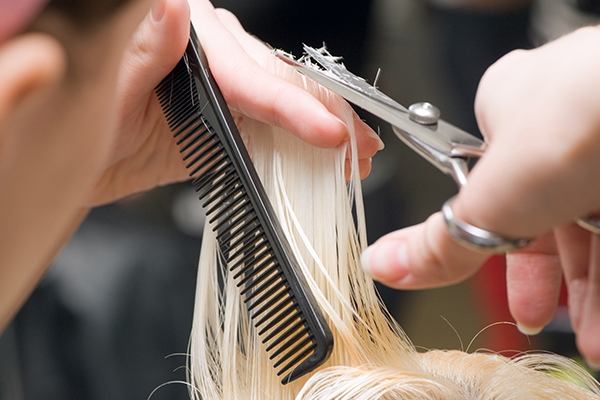
The ends of your hair are extremely sensitive and get damaged easily. They are the oldest part of your hair and hence usually dry out sooner than the rest of your hair.
This leads to split ends and dull-looking hair. The split ends gradually extend to tear the whole strand, which not only makes your hair look dull but also hinders hair growth.
This is why it is very important to trim your hair regularly to get rid of split ends and to facilitate speedy and healthy hair growth.
6. Avoid dry air
Dry air can strip the moisture from your hair, making it excessively dry. If your bedroom feels arid, install a humidifier to impart moisture to the air. Sleeping near a humidifier can help add moisture to your hair overnight.
Can Sleeping With a Silk Cap Reduce Hair Damage?
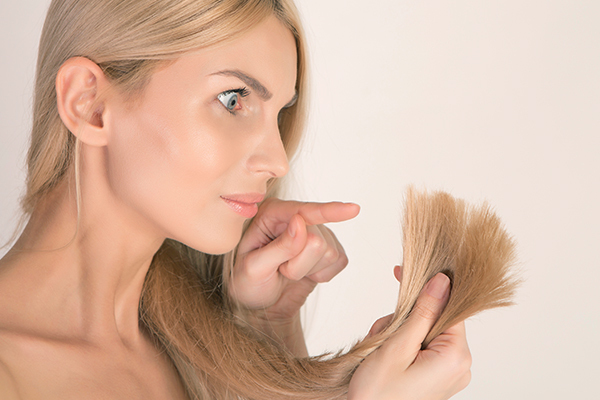
A silk cap cocoons your hair and keeps it from rubbing against the pillow during sleep. Given that silk is itself a very soft, slippery fabric, it does not cause any friction against the hair as well.
So yes, going to bed with a silk cap on can help protect your hair from unnecessary damage or breakage while you sleep.
Final Word
Good sleep is essential for a healthy body. Your body recharges itself while sleeping, and the hair is no exception. Damage repair, nutrient absorption, and hair growth are all vital processes that occur in your scalp tissues overnight.
Practicing a proper hair care routine at bedtime can further rejuvenate and strengthen your hair.
- Was this article helpful?
- YES, THANKS!NOT REALLY


